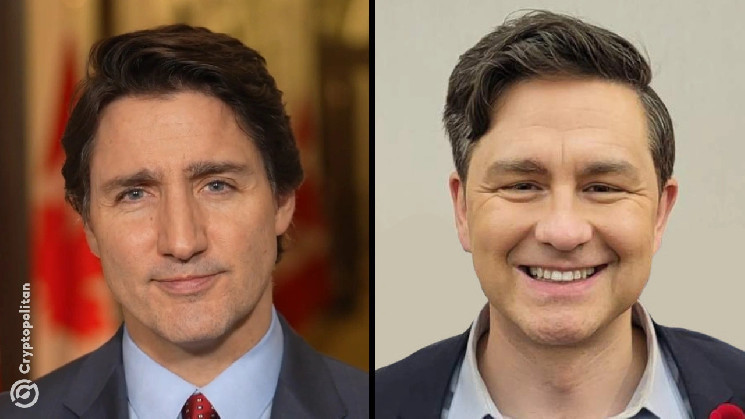Paragraph 1: Trudeau’s Departure and the Rise of Poilievre
Justin Trudeau’s resignation as Prime Minister of Canada in January 2025 marked the end of nearly a decade of Liberal leadership and opened the door for a potential significant shift in the country’s political landscape. This departure created a power vacuum that Pierre Poilievre, the leader of the Conservative Party, is poised to fill. Poilievre’s popularity surged, positioning him as the frontrunner in the race to become Canada’s next Prime Minister. Prediction markets gave him an 87% chance of victory, reflecting substantial public support and aligning with a growing interest in his distinct policy positions, particularly his views on cryptocurrencies. Trudeau’s resignation provides a pivotal moment for Canadian politics, with the potential for substantial policy changes across various sectors, most notably in the realm of digital assets.
Paragraph 2: Poilievre’s Vision for Cryptocurrencies in Canada
Poilievre’s stance on cryptocurrencies stands in stark contrast to the policies of the outgoing Trudeau administration. He champions a libertarian approach, advocating for individual financial freedom and minimal government intervention in the cryptocurrency market. He has openly criticized the concept of a central bank digital currency (CBDC), arguing that Canadians should have the autonomy to manage their finances without undue government oversight. This position has resonated with a significant portion of the electorate, particularly those who view cryptocurrencies as a hedge against inflation and a tool for financial empowerment. Poilievre’s embrace of cryptocurrencies has drawn comparisons to the populist appeal of Donald Trump in the United States, suggesting a potential realignment of Canadian politics towards a more decentralized and deregulated financial landscape.
Paragraph 3: Contrasting Approaches to Cryptocurrency Regulation
The Trudeau government’s approach to cryptocurrencies was marked by caution and regulatory scrutiny. A prime example is the government’s decision to freeze 34 cryptocurrency wallets associated with the 2022 Freedom Convoy protests. This action drew criticism from the crypto community, who viewed it as an overreach of government power and a potential threat to individual financial liberties. Poilievre’s anticipated ascension to power signifies a potential paradigm shift in Canada’s cryptocurrency regulatory framework. Unlike the centralized regulatory structure of the United States, with its powerful Securities and Exchange Commission (SEC), Canada’s approach is more fragmented, with provincial regulators playing a significant role. This decentralized structure limits the potential influence any single political leader can exert on the cryptocurrency market, requiring a more nuanced approach to regulatory reform.
Paragraph 4: Alternative Candidates and Their Perspectives
While Poilievre emerged as the dominant contender, other potential successors to Trudeau surfaced, each with their own perspectives on cryptocurrencies. Mark Carney, former Governor of both the Bank of Canada and the Bank of England, represents a more cautious approach. Carney acknowledges the potential of stablecoins, particularly within a well-regulated environment, but emphasizes the need for prudent oversight. While he currently expresses disinterest in holding public office, his deep understanding of finance and nuanced views on digital assets position him as a potential influential voice in future policy discussions. The diverse perspectives of potential leaders highlight the ongoing debate surrounding the optimal regulatory framework for cryptocurrencies in Canada.
Paragraph 5: The Upcoming Election and the Future of Bitcoin
The October 2025 federal election became a focal point for the future of cryptocurrency regulation in Canada. Poilievre’s continued strong showing in prediction markets, despite slight fluctuations, solidified his position as the favorite. His clear policy positions and the public’s appetite for change fueled his momentum. The increasing global interest in Bitcoin as a national reserve asset, with countries like El Salvador and Panama leading the charge, adds another layer to the discussion. Poilievre’s potential victory could propel Canada into this arena, potentially integrating Bitcoin into its national reserves. This move would represent a significant endorsement of Bitcoin’s legitimacy and further integrate cryptocurrency into mainstream finance.
Paragraph 6: The Potential Impact of a Poilievre Premiership
A Poilievre-led Conservative government could usher in a new era for digital assets in Canada. The potential adoption of Bitcoin as a reserve asset represents a significant shift in the country’s financial strategy and could position Canada at the forefront of the digital asset revolution. This move could attract further investment and innovation in blockchain technology, fostering economic growth and potentially enhancing financial security for Canadians. Poilievre’s emphasis on individual financial freedom and privacy aligns with his vision of a more decentralized and less regulated financial system. Trudeau’s resignation marked a turning point, creating an opportunity for a fundamental rethinking of Canada’s approach to cryptocurrencies. The upcoming election holds significant implications for the future of digital assets in Canada, with the potential for a dramatic shift in policy direction under Poilievre’s leadership.


